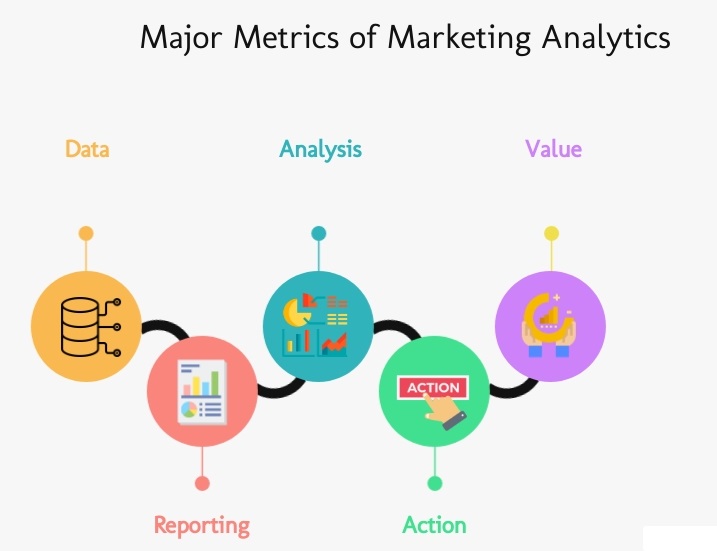How Real Time Marketing Analytics Can Change Your Business Strategy?
Increasingly, businesses are realizing that real-time marketing analytics is a must-have in the world of digital marketing. Companies can make better decisions about where to allocate resources and how to adjust their marketing strategies on the fly when they track and analyze data in real-time.
Table of Contents
- Definition Of Marketing Analytics
- Benefits Of Marketing Analytics
- What Is Real-time Marketing?
- What Is a Critical Factor For Success In Real-time Marketing?
Among the many business deviations that the COVID-19 pandemic has caused is the increased reliance on real-time marketing. The real-time reciprocation of actions is now a trend and will be seen in use even more in 2022.
In order to react quickly to customer queries, companies now strive to respond to them in real-time. Most marketers have also realized the value that a customer data platform (CDP) adds to evaluate the success of their marketing campaigns and strategies.
Express Analytics’ CDP Oyster, for example, does that and more. From simple transforms to complex data mining analytics, Oyster can do it all.
The idea behind real-time marketing propelled by analytics is to use all the data, processes, and technologies available in the market today to serve customers in their exact hour of need, not outside it.
In this post, we will tell you how to attract your audience using real-time marketing fueled by real-time marketing analytics, and why it is one of the best methods for growing your business in the trying times we live in today.
Also, by the end of the post, you will learn why some experts claim that real-time data can boost conversions by as much as 200 percent.
Optimize Your Marketing Budget and Make Smarter Business Decisions
What is Marketing Analytics to Begin With?
Modern-day marketing is spearheaded by data and its analytics. Businesses cannot determine whether their marketing efforts are providing the expected return on investment (RoI) without analyzing relevant key performance indicators (KPI).
Marketing analytics is the collection of statistical, mathematical, and predictive data about consumers’ actions and behaviors.
Marketers use marketing analytics to manage and study various metrics to find out the RoI of content like blogs, marketing channels, and calls-to-action (CTAs), among other things.
The goal of marketing analytics is to identify the behaviors and attitudes of consumers in order to help businesses make better decisions about how to market their products.

The data collected from marketing analytics can be used for many purposes, including:
- Identifying new opportunities for growth
- Providing insights into customer preferences
- Helping build long-term relationships with customers
Benefits of Real-Time Marketing Analytics
Real-Time Marketing analytics should not be thought of as a tool that can boost your company’s performance in a short period.
It requires continuous improvement and an effort on the part of all parties involved in order to reap tangible benefits.
The goal of marketing analytics is to offer your company a way to gather vital information on what the public thinks of your products or services and use this data to update your strategies and improve your operations.
Some of the major benefits of real-time marketing analytics are:
Increased efficiency
Increased efficiency is especially important when it comes to large companies that deal with a lot of data and a multitude of clients.
The data that you gather can help you understand which products and services are most profitable, and where your sales lie.
The information you gather is based on consumer behavior and can help you adapt your products to appeal to the exact market you need.
With marketing analytics, you can quickly analyze your data and make changes to the operations based on the results.
Increased productivity
If you use marketing analytics, you can monitor the daily operations in your company and maintain a steady stream of results.
This is significant because you can use the data to provide your staff with information and inspire them to go above and beyond in their work.
The results can also help your company plan ahead for marketing and customer needs, allowing you to build a stronger brand that is consistent.
Marketing analytics can also help answer questions like:
- Are my marketing resources allocated correctly?
- Is my business allocating the right budget to the right channels?
- How do I prioritize my marketing investments?
Optimize Your Marketing Budget and Make Smarter Business Decisions
Brands that Actually Implement Real-time Efforts will Outperform Competition
The term “real-time marketing” is often thrown around, but only those businesses that can actually put it into practice can outperform their competition.
By being able to react quickly to current events and trends, they are able to create content that is more relevant and engaging to their audience.
The problem that businesses face is that real-time marketing is very hard to implement.
For this reason, many companies spend years researching best practices before they can finally get the product or service out there in the world.
And here’s the thing: real-time marketing is not achievable at all without real-time data. Modern marketing technology, however, makes it possible to get that real-time data and act on it quickly.
Again, compared to the earlier years, a CDP now makes this task vastly easy.
Nowadays, marketing professionals have at their disposal a multitude of channels to reach out to prospects and customers: mobile apps, websites, social media, email, and Internet of Things devices, to name just a few. All such data from disparate sources can be collated by a CDP for faster analysis.
Real-time Marketing Adds Immediacy to Customer Interactions
Along with retail, including online B2C businesses, the other sector that has started using real-time marketing to a great degree is the telecom sector.
By monitoring social media and other online channels for customer feedback and needs, telecom providers are able to provide relevant and timely responses that improve customer satisfaction and loyalty.
An example of this would be a telecom company using a smartphone app to provide customers with real-time information about their current billing and usage. This may seem simple enough, but what it delivers is the ability to track the minute-by-minute consumption of the bandwidth by a consumer.
Real-time marketing allows companies to market products and services in real-time, not in days or weeks.
Customers have the ability to know about product offers at any time, throughout the day or night.
Companies can, for example, offer, real-time customer service updates. Over social media accounts, users can see any new developments, statements, and responses in real-time. In addition, companies can send real-time text messages or calls to customers to inform them of new products or service developments.
Real-time Data Access Means… In Real-Time
Real-time data access means that you can get the information you need as soon as it is available. This means that your team does not have to wait hours, days, or weeks to find out what is happening.
They get it in real-time so that they can make decisions right away and act on that information. Real-time data access means you can get access to the information that matters
Real-time data access is important because it enables you to get the information that you need.
For example, if you are an online retailer and have promotions you want to run, you might want to know the exact number of consumers who visit your website or buy your product.
You also might want to know when exactly customers place orders and how many purchase your product on the first day of a promotion.
What is A Critical Factor for Success in Real-time Marketing?
The critical factor for finding success with real-time marketing is having a well-defined process in place for capturing and sharing customer feedback in real-time.
Companies can think of real-time strategies but may be lacking in having the right technology to implement them. Without the proper process and metrics in place, companies may not be able to leverage their customer data.
So, once you have the right process in place, it is important to consider the technical infrastructure.
For example, if you want to share your customer’s location and other real-time data such as store purchases, customer location and address can be captured by embedding location information into mobile applications and building a location-aware customer experience.
By leveraging the technological infrastructure, your business can better understand the needs of its customers. With this data in hand, companies can take additional action to meet the needs of their customers and gain a competitive advantage.
Real-time Marketing Analytics is Must-have Today
As the world of digital marketing continues to evolve, real-time marketing analytics has become a must-have for businesses.
By tracking and analyzing data in real-time, companies can make more informed decisions about where to allocate their resources and how to adjust their marketing strategy on the fly. Out-of-the-box solutions can help you optimize your marketing ROI.
More and more businesses are turning to SaaS companies like Express Analytics to provide real-time analytics. Unlike traditional software, these solutions are designed to work alongside your existing systems.
By providing you with additional insight and allowing you to collect data in real-time, these SaaS solutions provide you with the ability to make more informed decisions about your marketing strategies. You can use real-time analytics to make the most of your marketing spend, boost sales, and increase your bottom line.
Optimize Your Marketing Budget and Make Smarter Business Decisions
Here’s How Express Analytics Can help with Real-Time Marketing Analytics
Express Analytics offers marketing analytics solutions for all types of businesses. We make sure every marketing campaign counts.
By using our marketing analytics services, you can easily design and measure your campaign’s key performance indicators.
You can get a full picture of your customers by gathering everything you know or want to know about them.
Through our campaign management analytics solution, we tailor campaigns to target customers individually, allowing you to respond to your customers’ changing needs.
You can also deliver a consistent experience across channels in order to build brand loyalty.
Build sentiment analysis models with Oyster
Whatever be your business, you can leverage Express Analytics’ customer data platform Oyster to analyze your customer feedback. To know how to take that first step in the process, press on the tab below.
Liked This Article?
Gain more insights, case studies, information on our product, customer data platform


No comments yet.